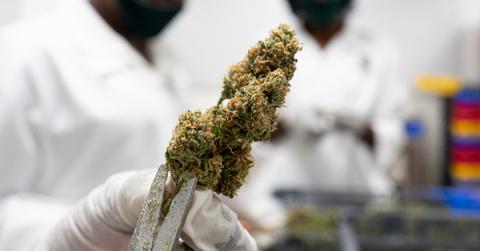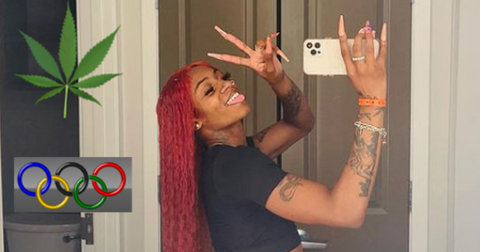The Fastest Woman in America Can't Rep USA in Olympics Because She Smoked Pot
Jul. 3 2021, Published 11:17 a.m. ET

If you're into Brazilian Jiu-Jitsu, then you've probably rolled with players who've choked you out or put your limbs at risk. You probably also found out after the fact, or maybe while they were anaconda-ing you around the mat, that they were stoned to the point of no return. Now, I don't know about you, but save for like two occasions, all weed has ever made me want to do is eat junk food, watch old-school pro wrestling promos, and listen to great music. So why is it banned from the Olympics?
Is weed banned from the Olympics? Yes. Yes it is.
You're not allowed to partake in international competition, or most other competitive sports, if you test positive for weed metabolites. USADA, the United States Anti-Doping agency has weed on its list of banned substances. Which means that athletes who have marijuana in their system will fail their USADA tests. Which also means that they won't be able to represent their country overseas.

This includes the fastest woman in America right now, Sha'Carri Richardson. But she isn't being disqualified because marijuana is considered a performance enhancing drug, it's because the substance violates at least two of three of USADA's following rules when it comes to athletes ingesting questionable substances.
The three "tenets" are:
- The substance poses a risk to an athlete's health.
- It has performance enhancing potential.
- It violates the "spirit" of the sport.
So which two of these tenets did Sha'Carri violate after getting lit? It'd be hard to argue that marijuana can really "enhance" someone's performance for a competition, unless we're talking about a pie eating contest.
As for there being a potential risk to an athlete's health, well, if she smoked weed then the argument could be made that the carcinogens from lighting up could play a factor in harming herself. The "spirit" of the sport is technically the other violation that she's breaking. That seems to really hedge on governing bodies' attitudes towards said sport.
A 2011 article sponsored by WADA argues that using marijuana violates all three of the aforementioned rules, including the performance enhancing claim based on these side effects: improved vision, muscle relaxation and reducing spasms. However, the same argument could be made for a healthy diet, getting enough sleep, and massages.
Recent legislation and widespread social acceptance of cannabinoid consumption has prompted immense outrage to Sha'Carri's Olympics ban. And David Epstein, author of The Sports Gene stated that he doesn't "think marijuana is performance enhancing, or that it should be banned in any sport."
Michael Phelps set a gold medal record, and he had a weed scandal of his own.
There are several articles being penned about the inordinately harsh stance the Olympics takes on marijuana, even compared to professional sports. The blowback that Michael Phelps received after a picture of him holding a bong circulated the internet, shortly after he won a boatload of gold medals, shows how much more harshly Olympic athletes are judged when it comes to pot.
It's important to note that Sha'Carri used marijuana in Oregon, where recreational marijuana usage is legal. Heck, everything is legal there and honestly, which makes the reasoning for Sha'Carri's ban that was cited all the more baffling — that it was a "substance of abuse."
Sha'Carri's biological mother passed away during her Olympic trials, and after coming in first, Sha'Carri decided to take the edge off by smoking some pot in a state where it's legal to do so.
You know what else is legal to do in Oregon? Cocaine. Small amounts of heroin. Mushrooms. She could've partied WAY harder, but instead, she got high on a little bit of cannabis before going to the Olympics.
Will the Olympics' stance on weed change in the future? Well, according to this Slate article, which references a 2018 paper from the Clinical Journal of Sports Medicine, there are some promising developments.